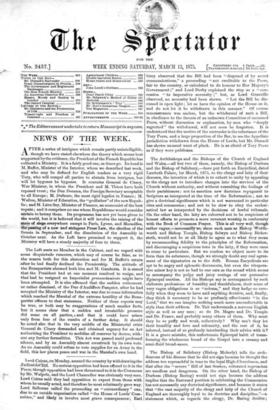Lord Cairns, on Monday, amazed the country by withdrawing the
JudicategiBill. No serious opposition had been offered to it in the -Peers, though opposition had been threatened to it in the Commons by Mr. Walpole, and the Lord Chancellor was obviously very sore. Lord Cairns said they had opposition to expect from those with whom he usually acted, and therefore he most reluotantly gave way. Lord Selborne called the proceeding an " extraordinary " one, clue to an outside organisation called "the House of Lords' Com- mittee," and likely to involve most grave consequences ; Earl
Grey observed that the Bill had been "disposed of by secret communications," a proceeding "not creditable to the Peers, fair to the country, or calculated to do honour to Her Majesty's Government ;" and Lord Derby explained the step as a "con- cession "to imperative necessity ;" but, as Lord Granville observed, no necessity had been shown. "Let the Bill be dis- cussed in open light ; let us have the opinion of the House on it, and do not let it be withdrawn in this manner." Of course remonstrance was useless, but the withdrawal of such a Bill, in obedience to the threats of an unknown Committee of unnamed Peers, without discussion or explanation, by men who "deeply regretted" the withdrawal, will not soon be forgotten. It is understood that the motive of the surrender is the reluctance of the Tory Peers, and a large proportion of the Bar, to see the Appellate jurisdiction withdrawn from the House of Lords, but Mr. Disraeli has shown unusual want of pluck. He is as afraid of Tory Peers as if they were publicans.


































